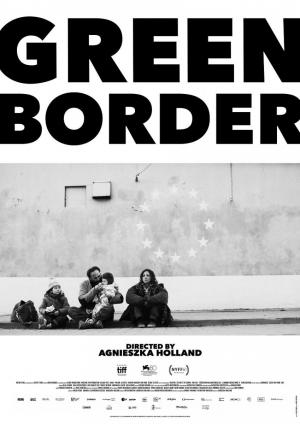Green Border
Introduction
I just can’t imagine how tough it would be to leave your home behind while being forced to migrate to a new country. I had some time off from the usual set of new releases that prompted me to experiment with some of the content from the International circuit. With that, I zeroed upon the new Polish film Green Border which had previously premiered at MAMI. From the looks of it, this seemed to be stemming out of the conflict between Belarus and Poland, both countries who have been at loggerheads with each other due to the refugee crisis.
The refugee crisis has been a huge talking point ever since 2014 with the onset of the Syrian War. Millions of people from Syria, Afghanistan and parts of Africa have used the mediterranean corridor to migrate to the European Union. And while few have made it alive, several others have lost their lives. But the geo-political situation is such that some countries of Europe haven’t been too welcoming while others have tried to use the situation almost as a propoganda to benefit themselves. A little read of the Belarus vs Poland conflict revealed that the dictator of Belarus offered a free passage to the refugees to Poland, only for Poland to retaliate by sending off refugees back to Belarus. This was particularly the worst thing for the refugees who invariably weren’t welcome in either of the two nations in 2021. This was contrary to the refugee crisis of Ukraine wherein members were infact welcomed in Poland much to the dismay of Belarus which was an ally of Russia. This entire mesh in the geo-political arena was the seed of the film Green Border. So then does Green Border manage to impress, let’s find out.
Story & Screenplay
Based on true events, Green Border is a story of a refugee group, a border guard and a newly minted activist whose worlds collide on the swampy and treacherous forests that make up the border of the two nations, Belarus and Poland. The story here is an unflinching look at the ongoing refugee crisis and how the geo-political setup provides no respite or remorse to the folks who have left their homes behind. This for me was such a sad aspect of the reality that we live in, that my heart absolutely goes out to the ones suffering while sending them thoughts of positivity. This, while being in no denial that my life is luxurious, often reduced to passing stray remarks from my couch. The screenplay standing at a shade above 150 minutes is heavy on the palate given the drama which is unfolding despite not showcasing all the action unfolding onscreen, while setting a pretext of parts of the drama unfolding behind the camera. But the events are relentless, almost unfolding like a thriller that offers you plenty of fodder to reflect on.
The drama is divided into chapters, each dedicated to the parallel tracks unfolding through the proceedings. Firstly, you are introduced to the bunch of refugees featuring a family from Syria, an English Teacher(and later on a family from Africa who join the group) from Afghanistan who have fled from their motherland. What begins as a hopeful journey of crossing the borders seamlessly, soon transforms in one of the painstaking accounts of the exercize of power between the two nations. The atrocities subjected to the refugees may not be in your face but it is enough to build a painful picture of the actions that they are subjected to, in a rather uninhibited manner. The second track involves the story of a border guard who has been carrying out his duties as instructed while also taking care of his pregnant wife. Despite this, he fails to show remorse to another pregnant lady while tossing her across the border nonchalantly in one of the most shocking scenes of the film. To complete the triangle is a middle aged woman volunteering to be an activist after witnessing the atrocities of the authorities in Poland.
The three parallel tracks unfold independently while only briefly colliding with each other. But the writing here always maintains a grip on the proceedings without showing any remorse whatsoever. As a result, the drama does get heavy, much like our hearts, while witnessing the painful journey of all the three tracks. There are subtle twists and turns that may not be entirely unpredictable but contribute to the shock value in the drama while gently highlighting the geo-political setup of how things stand between two countries. And this is rather unfortunate given that the refugees are used as tools of propoganda to quench your thirst for power while everyone around you stands to lose. This is reflective of the untimely arrest of the activist who is literally made to strip at the police station while barely being charged for anything, something that she obliges before going about her task of helping the refugees with sincerity.
But the drama does showcase some sort of hope in the final act with a minor transformation in the character of the border guard who lets a vehicle with refugees pass having previously sounded by his wife on being empathetic. This, while a group of African refugees successfully make it to a shelter home while allowing them a chance to seek asylum. The onset of the rap song while glaring into the fourth wall will make you squirm in your seat. It is truly said that the world comprises of mostly good people who look through the agendas of the authorities while going out of the way to help humanity which is how it should be. And the brief epilogue of the Ukraine refugee crisis sums up the sentiment. Overall, the screenplay is heavy but important and relevant in times that we live in while also being brilliantly absorbing in many ways.
Dialogues, Music & Direction
The dialogues are conversational but important to briefly convey the politics of the land(s) ruling the roost. The BGM is sparingly used, often resorting to the natural sounds of the surroundings that adds a layer of rawness to the drama. The cinematography adds depth to the drama with a stunning monochrome setup that acts as a metaphor for the lives of the people of the film, hoping against hope for things to work out well at the end. The editing is pretty good, seamlessly integrating three stories in a rather lucid manner without breaking the flow of the drama. Director Agnieszka Holland provides an unflinching outlook to the refugee crisis while accurately highlighting the geo-politics of the land(s). She sprinkles the drama with some well etched out characters while showcasing their pain beautifully well. The direction is excellent here.
Performances
The performances are wonderful by the ensemble cast. Malwina Buss as Kasia has her moments to shine while gently emoting the sentiment of empathy. Monika Frajczyk as Marta is wonderfully understated in a beautifully written role. Jasmina Polak as Zuku is sincere and earnest. Mohammed Al Rashi as the Grandfather delivers an aching performance with his haunting expressions. Dalia Naous as Amina delivers a painstaking performance that absolutely shatters you when she cries for her dead child. It was a wonderfully heartfelt act. Tomasz Wlosok as Jan has a lovely character arc that he beautifully portrays onscreen. There is a sense of earnestness in his performance that reflects well with his character. Behi Djanati Atai as Leila is spot on with her heartfelt act. There is uncertainty associated with her character with a brief bout of guilt and she wonderfully portrays these deft emotions. Jalal Altawil as Bashir is a man of few words but his silence speaks a thousand words thereby reflecting his pain so well. Maja Ostaszewska as Julia is outstanding to the core in an uninhibited and unabashed performance laced with empathy, warmth and courage. She was brilliant to witness while never losing the pitch of her character.
Conclusion
Green Border is an unflinching and uninhibited look at the European Refugee Crisis that laced with the geo-politics of the land makes for a powerful and absorbing watch.




